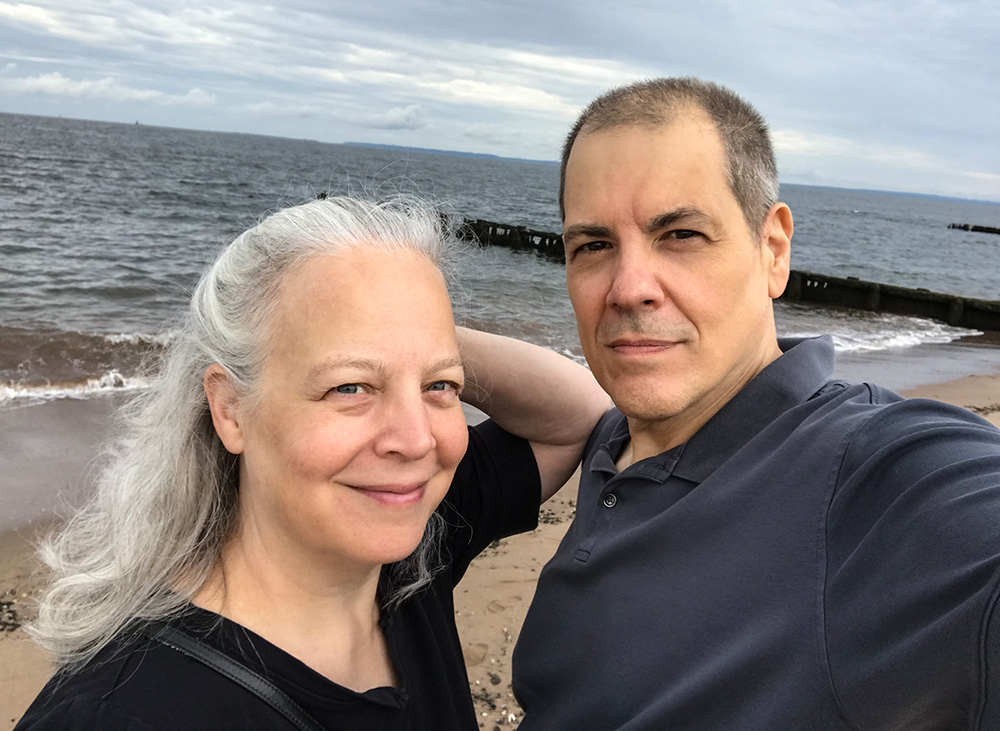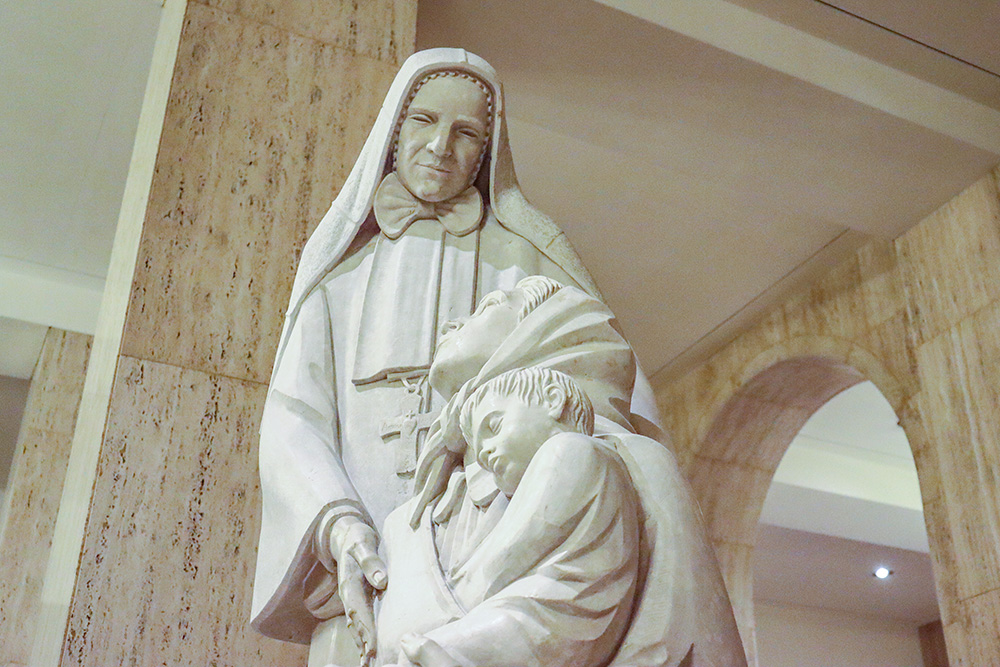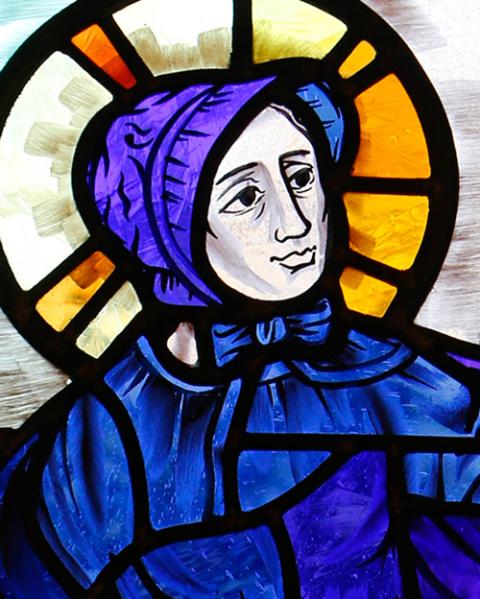
The latest project of New Jersey filmmakers Marylou Tibaldo-Bongiorno and Jerome Bongiorno is a pair of documentaries titled "American Women Saints" that focus on Elizabeth Ann Seton and Frances Xavier Cabrini. (Courtesy of Marylou Tibaldo-Bongiorno and Jerome Bongiorno)
Jerome Bongiorno and Marylou Tibaldo-Bongiorno make no bones about it: their Catholic faith is very much a part of their mission as filmmakers.
The married couple's latest project is a pair of documentaries titled "American Women Saints" that focus on Elizabeth Ann Seton and Frances Xavier Cabrini. Broadcast initially on PBS in March, the two films are now streaming on the PBS website through Aug. 31.
In the documentaries, the two saints talk from "beyond the grave" via Tibaldo-Bongiorno's first-person narration. It's an unexpected technique for the format, but in these films viewers hear the saints speak in a colloquial, modern tone — with a decidedly New Jersey accent.
For graphics, the Seton documentary relies on paintings, illustrations and Bongiorno's impressionistic animation for visuals. The Cabrini film has a wealth of archival photographs and some film clips.
While many applaud the films, they have not escaped criticism, particularly for the relentless pace of narration. After screening the documentary on Mother Seton, Alice Elliott, an Oscar-nominated documentary producer who heads New York University's undergraduate documentary program, told me she felt as if the film was developed for Catholic school education — almost as a slideshow — rather than undertaken as a serious documentary.
The Catholic Communication Campaign, which was established by the U.S. Conference of Catholic Bishops to help spread the Gospel using modern media tools, is a major funder of the two documentaries. But despite such funding, the filmmakers are not shy about criticizing priests and bishops who were obstacles to these driven women who founded orders, schools, hospitals and orphanages.
"You have to call out at certain times in these women's lives the people who were standing in their way," said Tibaldo-Bongiorno.
The couple makes no secret of their position on the role of women in the Catholic Church, and feel it is ludicrous that women like Seton and Cabrini couldn't preach from the pulpit.
Asked if they had pushback from the Catholic Communication Campaign over the content in the documentaries, Tibaldo-Bongiorno replied, "The whole point is to be balanced."
"No, not balanced, truthful," Bongiorno interjected. "We've walked away from projects simply because we wouldn't have the final cut."
"And that's clear to anyone who funds any of our work," said Tibaldo-Bongiorno. "That means no holds barred. We're going to show what we find."
In order to be aired on PBS, the content of documentaries may not be dictated by funders. The couple said they don't want these documentaries on the saints solely relegated to Catholic media.
"We wanted them treated as historic figures, iconic women who trailblazed," said Tibaldo-Bongiorno.
"They weren't obedient, passive women," said Maryann De Leo, a Manhattan-based documentary producer who won an Oscar and two Emmy Awards for her work. "I knew about them but I never really paid attention to their lives. I learned so many things about these women!"
Seton is the first American-born Catholic to become a saint. She founded the Sisters of Charity of St. Joseph and her life story is set against the backdrop of the birth of U.S. Catholicism in the late 1700s.
Cabrini was born and grew up in Italy. She founded the Missionary Sisters of the Sacred Heart of Jesus and was described by one critic as "a bulldozer of a woman in a habit." Her documentary includes a history of early-20th-century Italian emigration to the United States.

A statue of St. Frances Xavier Cabrini, patroness of immigrants, is seen in the Basilica of the National Shrine of the Immaculate Conception in Washington, D.C. Cabrini is the subject of one of two documentaries created by Jerome Bongiorno and Marylou Tibaldo-Bongiorno, now streaming on PBS.org. (NCR photo/Teresa Malcolm)
"They should be a model to anybody, not just Catholics, not just Christians," said Bongiorno. "These are models for anybody to follow."
"These saints dedicated their lives to celebrating God," added Tibaldo-Bongiorno. "And we're saying the only way to serve God is by serving other people, putting the needs of others before your own needs and wants, getting out of your comfort zone and fighting for what is right."
Though both have directing credits for the Seton and Cabrini documentaries, Tibaldo-Bongiorno usually directs and produces their films. Bongiorno shoots and edits the footage. The husband and wife taught in Catholic high schools for several years and received a Catholic education from grade school through college. They met in a biology class at St. Peter's College in Jersey City, New Jersey.
One of the benefits of working with your spouse, Bongiorno said, is having the ability to talk about a work in progress 24/7.
"I'll get up at 2:30 in the morning and wake her up and tell her my idea and immediately get to work on it the next day or maybe at that hour if we need to," said Bongiorno. "It really speeds up the process."
Asked why so much of their work has focused on New Jersey, Tibaldo-Bongiorno replied: "We film what we know. That's what we've done since the beginning."
Advertisement
She has lived in Newark, New Jersey, her entire 61 years. Her husband, who is also 61, grew up on Staten Island, New York, across the Arthur Kill from New Jersey.
New Jersey's largest city has figured prominently in their work, which includes a trilogy of documentaries: "Revolution '67" focuses on the July 1967 civil disturbances in Newark; "The Rule" chronicles a prep school for Newark's African-American and Latino boys run by the Benedictine monks of Newark Abbey; and "Rust" presents a history of deindustrialization, racism and mass incarceration in the Rust Belt, using Newark as a microcosm.
"It's become very important for us to be in Newark," said Bongiorno.
"And be part of the community," Tibaldo-Bongiorno added. "It's a strong community and we've been nurtured by that community over a long period of time."
"Marylou and Jerome are also two of the most caring and genuine people I know," said Doug Doyle, news director of Newark's public radio jazz station, WBGO. "Their commitment to tell inspiring stories about their beloved Newark and beyond is refreshing. Their films about faith, history and inner-city poverty make you think and respond."








